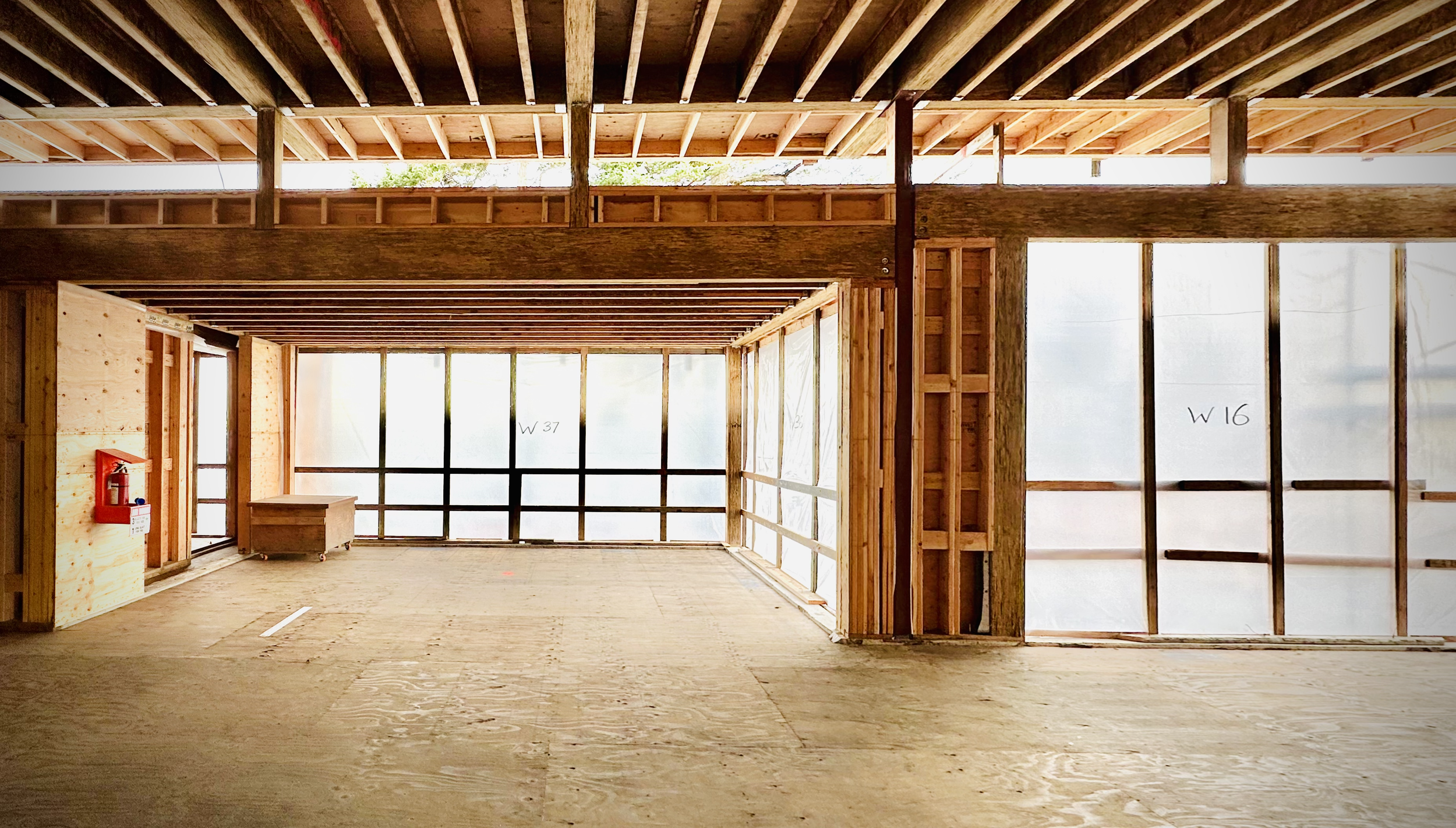Choosing the Right General Contractor: Making Informed Decisions
Choosing the right Contractor for your project is a significant decision that requires careful consideration and assessment of competency, trustworthiness, & professionalism. Though undertaking construction of any kind inevitably involves some level of risk, the General Contractor’s job is to reduce risk for the Client. Since the Client is often the key decision maker in a project, a good General Contractor will provide you with the right information to save you from exposure to unnecessary risk. In this blog post, we outline 14 key factors to evaluate when determining if a construction company is worth hiring to do this important work for you.
Image of the interior of a building mid construction. Wooden floors and beams are exposed and windows are covered in a protective film. The image is warm with natural light, yet industrial.
Assessing Competency & Trustworthiness
Credentials and Certifications: Be sure to verify if the construction company has the appropriate credentials, licenses, and certifications. A reputable Builder in BC should be a Licensed Residential Builder with the Province, they should be managed by trades people with Trade Qualification Red Seal Certification, and should possess degrees in Engineering or Construction Management.
Transparency and Communication: Evaluate the company's transparency and communication practices. Are they upfront about costs, timelines, and project details? Is their management software viewable and auditable by the Client? Clear communication is essential for building trust and maintaining a positive Client-Contractor relationship. Assess their communication style, are they volunteering helpful and necessary information or are they holding back? A great way to glean a little about a company’s communication skills and practices is to look through online reviews and read the comments of previous Clients.
Experience: A good building contractor will have experience in the trades that is vast and diverse, and preferably with a mixture of residential, commercial, & industrial job exposure. When looking for expertise, an expert building contractor will have 40,000+ hours of experience in the trades and no less than 20,000 hours of experience in construction management.
Owner Operator: Owner Operators will often provide a more personalized, professional experience, as large companies will often higher out management roles; in this case you will want to be sure to vet the individual that would be working as the Project Manager for your specific project.
References and Referrals: Request references or ask for referrals from past clients. A good builder should be able to provide a long list of referrals from happy Clients. Call the referrals and be sure to ask if they are good at communicating costs and schedules, as well as whether they are good at setting a reasonable expectation.
Quality of Work: Request a site visit to one of the company’s current projects. Examine the quality of work, attention to detail and the general organization and tidiness of their sites, and observe the company culture.
Reputation: Research the company's reputation and track record in the industry. Look at past projects, testimonials and reviews, on reputable platforms, to gauge their level of experience, quality of work, and client satisfaction.
Insurance: They should be well insured with General Liability Insurance and be in good standing with WorkSafeBC (clearance letters are available to the public online).
Supporting Documentation: Request the following supporting documentation for review:
Engineering and/or Management Credential(s)
Red Seal Trade Certificate(s)
Residential Builders License
WSBC Clearance Letter
Certificate of Insurance
Management Software Sample
Reference list of Past clients
Job Portfolio
Construction Contract - Terms & Conditions Sample
Professional CV
Initial Impressions: When a company demonstrates professionalism, responsiveness, and a commitment to understanding your project needs during the initial consultations, that is certainly a positive indicator of how the rest of your collaboration with them will go.
Clear Contracts and Agreements: Review the contract and agreements thoroughly. A reputable company will provide clear, detailed contracts that outline project scope, costs, timelines, warranties, and other essential terms.
Progressive Trust Building: If you have the time, start with smaller projects or phases to assess the company's performance and reliability. Gradually build trust based on their consistency, communication, and ability to deliver results.
Open Dialogue and Collaboration: Maintain open dialogue and collaboration throughout the project. Regular updates, progress reports, and transparent communication contribute to building trust and confidence in the company's capabilities.
Consult with others in the industry. Builder and Architect Firms are often happy to provide consultation in the decision making process. We understand the importance of making the right decision for you and your project and are happy to participate in your process in a consulting capacity.
Trust Your Instincts
Ultimately, trusting your instincts and intuition plays a crucial role in this type of decision. If you have done your homework and you feel confident in the company's abilities, professionalism, and commitment to your project's success, it may be worth taking the exciting next step to hire them!

